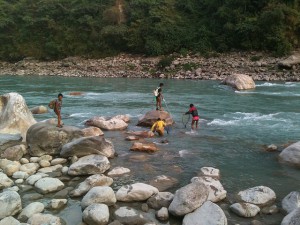Fish consumption from pesticide-contaminated waters pose human health risk
Pesticides enter waterways when they are washed off of plants and soils during rainstorms, eventually making their way to fresh water sources including streams, rivers, and lakes. Once bodies of water become contaminated, aquatic life including fish, insects and amphibians are exposed to the toxins. Because wildlife such as fish can accumulate these toxins in their flesh, they provide an additional route of dietary pesticide exposure to humans who consume them. A recently published paper in the journal Ecotoxicology and Environmental Safety investigated the distribution of pesticides in the tissues (muscle, stomach, liver and gills) of four different fish in the Kabul River in Pakistan, and calculated the potential health risks for local consumers of those fish. They found that chemical accumulation was highest in the liver, followed by the muscle, stomach and gills. The carcinogenic risk assessment indicated that individuals who consumed fish from the rivers over the course of their lifetime had a high potential cancer risk, suggesting that consumption of fish by locals should be decreased to avoid harmful chronic exposure to pesticides.



